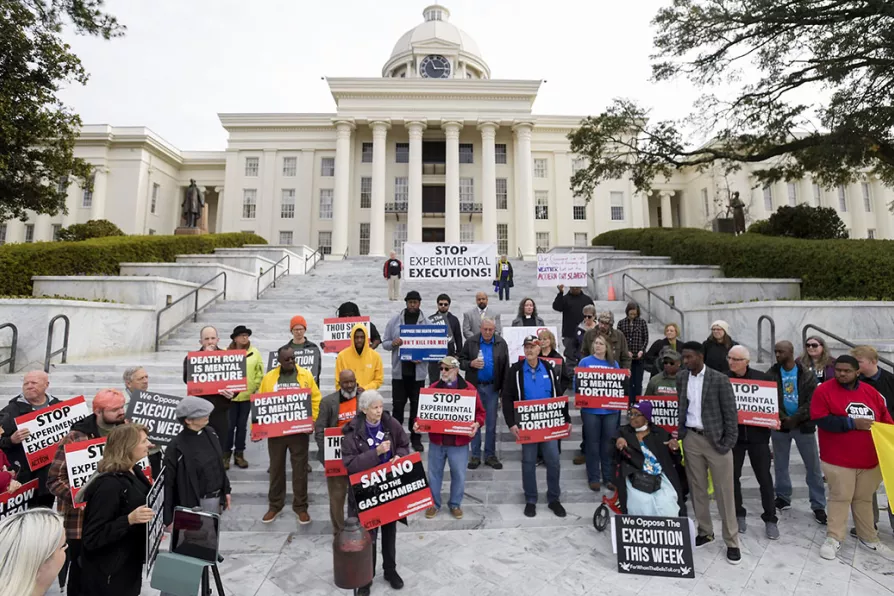The Carpathia isn’t coming to rescue this government still swimming in the mire, writes LINDA PENTZ GUNTER

 Nearly one hundred protestors gather at the state capitol building in Montgomery, Alabama, on January 23, 2024, to ask Gov. Kay Ivey to stop the planned execution of Kenneth Smith
Nearly one hundred protestors gather at the state capitol building in Montgomery, Alabama, on January 23, 2024, to ask Gov. Kay Ivey to stop the planned execution of Kenneth Smith
THE US often wastes no time in condemning what it views as barbaric behaviour in other countries, but barbarism was on full view when Alabama death row inmate, Kenneth Smith, 58, writhed in apparent agony for at least two minutes during his execution on the evening of January 2 2024.
Smith, who wore a full face mask, was still alive while breathing deeply for at least two more minutes after that, according to observers, followed by “a period of time during which media witnesses were unable to determine if he was breathing,” according to reporting by the Washington Post.
When I say “on full view,” independent witnesses to the execution were in fact severely limited, with only five reporters allowed in the execution chamber, along with family members of Smith and his victim.
Perhaps the Alabama prison officials were chastened by the experimental nature of what they were about to do. The chosen method of execution, nitrogen hypoxia, had never before been used to put human beings to death. Or perhaps they were nervous because this was their second attempt to kill Smith, after botching his 2022 execution by lethal injection, the method most commonly used.
That earlier ordeal had prompted Smith’s lawyers to take his case to the US Supreme Court, citing cruel and unusual punishment after Smith had been left on a gurney for hours after prison officials tried and failed to find a vein through which to administer the lethal dose.
The Supreme Court rejected Smith’s appeal on January 24, opening the way for the experimental execution in Alabama. Dissenting Supreme Court Justice Sonia Sotomayor noted that “Having failed to kill Smith on its first attempt, Alabama has selected him as its ‘guinea pig’ to test a method of execution never attempted before.”
In an ominous reminder of its previous failures, the Alabama Department of Corrections experienced a 45-minute delay before proceeding with Smith’s execution, due to “a hiccup on the EKG line.”
Smith’s spiritual adviser, Jeff Hood, who was present in the death chamber, told the progressive television news programme, Democracy Now! that, “What we saw was minutes of someone struggling for their life.
“We saw minutes of someone heaving back and forth. We saw spit. We saw all sorts of stuff from his mouth develop on the mask. We saw this mask tied to the gurney and him ripping his head forward over and over and over again. And we also saw correction officials in the room who were visibly surprised at how bad this thing went.”
An Alabama prison official claimed these responses were “involuntary.”
Twenty-seven US states still have the death penalty. It has been abolished in 23 others and in the District of Columbia.
The death penalty was officially made illegal in Britain in 1998, although it had been suspended in 1965, initially for five years and then permanently with the last execution taking place in 1964.
The US debate over the death penalty pits those who see it as a way to deter heinous crimes against those who view it as “an intolerable denial of civil liberties,” according to the US Civil Liberties Union.
Smith had been found guilty of the 1988 murder-for-hire of Elizabeth Sennett, whose husband, Charles Sennett Senior, had ordered the hit. A week later, Sennett killed himself after being identified as a suspect.
While Smith’s guilt was not in doubt,196 former death-row prisoners have been exonerated of all charges since 1973, according to the Death Penalty Information Centre.
Botched executions are by no means a rarity in the US. Most of these involve lethal injection but one of the most notorious occurred during an electrocution in Virginia in 1982 when prisoner Frank J Coppola’s head and leg caught on fire. According to an attorney present: “It took two 55-second jolts of electricity to kill Coppola. The second jolt produced the odour and sizzling sound of burning flesh.”
There are at least 60 documented examples of such failures. Dennis McGuire, killed by lethal injection in Ohio in January 2014, “gasped for air for some 25 minutes” while the drugs took effect. Joseph R Wood, executed in Arizona later that year, “repeatedly gasped for one hour and 40 minutes before death was pronounced.”
The horrific spectacle witnessed by the few permitted to be present in Alabama was a reminder that endorsing the murder of one human being to condemn the murder of another does little to deter future acts of murder such as Smith’s. Meanwhile, no-one knows how many people have been wrongly executed for crimes they did not commit.
Linda Pentz Gunter, a US-based writer, is the founder of the non-profit Beyond Nuclear — BeyondNuclear.org.

From terrifying the children of immigrants to pepper-spraying frogs, the US under Trump is rapidly descending into mayhem, writes Linda Pentz Gunter

The Trump government is seizing overseas students from their homes and campuses and even off the streets, with no legal grounds and no due process, writes LINDA PENTZ GUNTER











